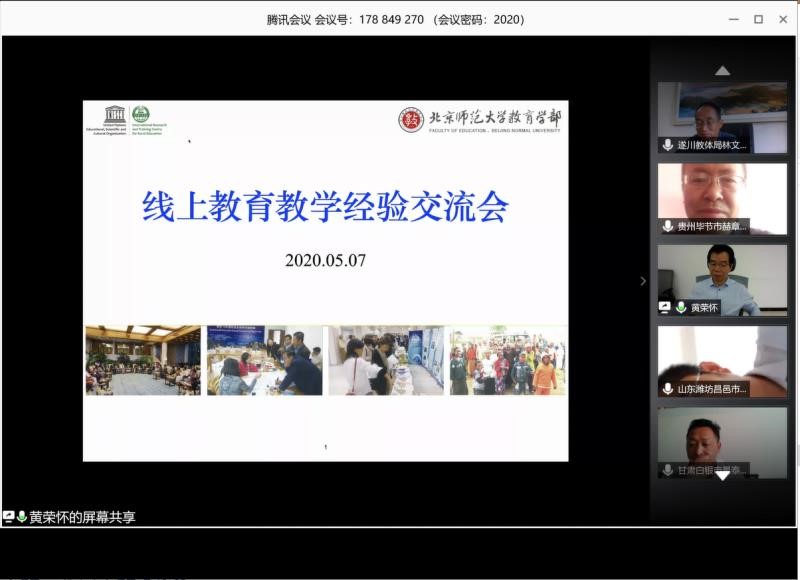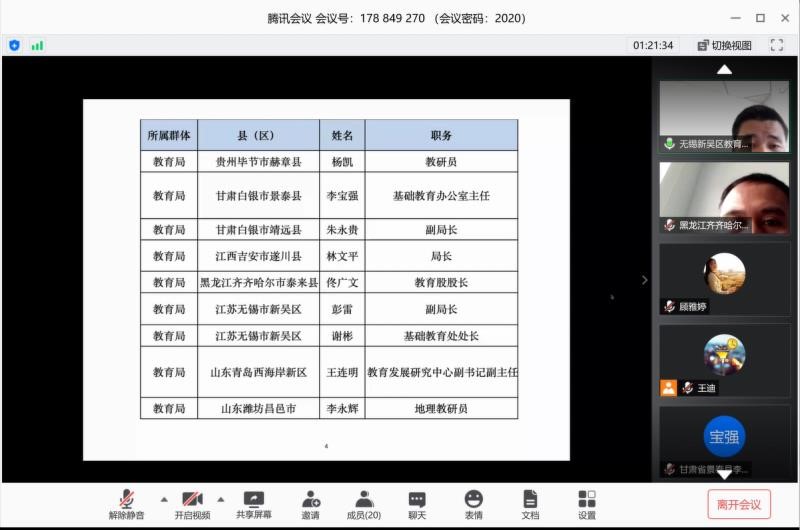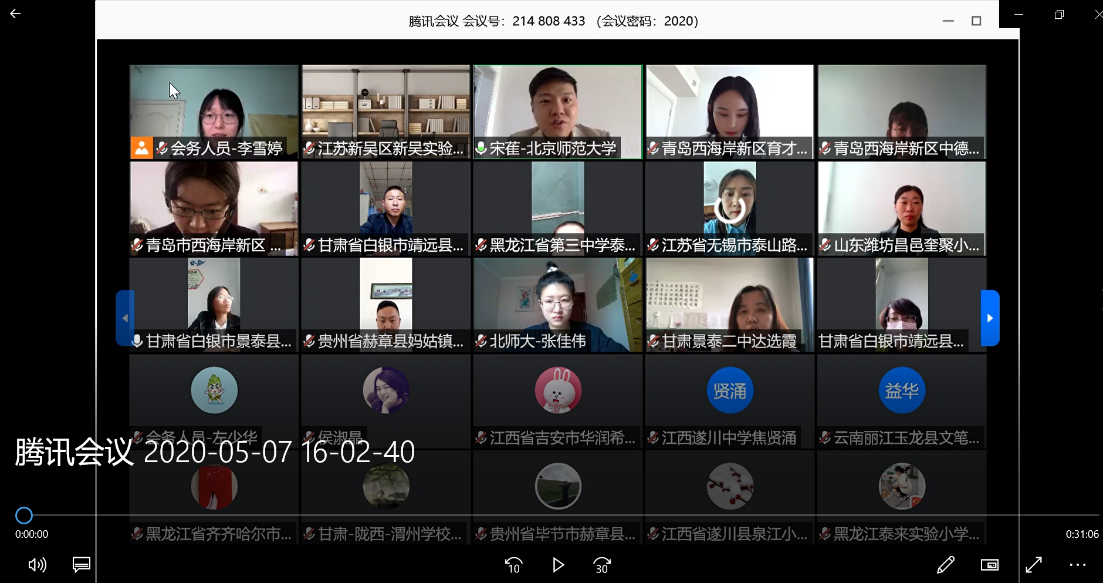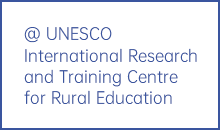What is the actual situation of local education bureaus, primary and middle schools, parents and children on the front line of fighting the pandemic? What are the characteristics of responding strategies of parents at different levels of schools and from different regions? In order to answer these questions, on May 7-8, the Faculty of Education of Beijing Normal University and the UNESCO INRULED jointly organized the "Online Education and Teaching Experience Exchange Meeting of Primary and Middle Schools ". The meeting adopted video conferencing and representatives from 10 districts and counties of China, namely, Chaoyang District of Beijing, Xinwu District of Wuxi, West Coast Development Zone of Qingdao , Changyi of Shandong Province, Suichuan of Jiangxi Province, Hezhang of Guizhou Province, Tailai of Heilongjiang Province, Jingtai of Gansu Province, Jingyuan and Longxi, joined the meeting. The meeting is composed of six parallel sessions attended by six different groups, namely, officials from local education bureaus, primary and middle school principals, teachers, parents, middle school students and primary school students, telling their "Online Education and Teaching" stories from their respective perspectives. Yunlong County, the pairing county of the BNU to offer assistance, also sent representatives to attend the discussion. Vice President Zhou Zuoyu took part in the session of school principals and gave a warm speech. Cheng Kang, representative of the Education Division of National Commission of the People's Republic of China for UNESCO participated in the meeting.

Online education, as a form of education under the pandemic, serves as a "provisional substitute" for offline education. However, it has brought about a large-scale experiment for the application of educational technology, presenting us with the possible forms and challenges of future education, including the issues of educational equity and quality in the digital era that UNESCO has been advocating for. At present, "post-COVID-19" education thinking has become a heated topic in the education community. Understanding the form of online education within the framework of UNESCO's "Education for Sustainable Development" and listening to the voices from the front line of education is the fundamental purpose of the Faculty of Education of Beijing Normal University and the UNESCO INRULED to organize this conference.
The education-bureau leaders discussion was chaired by Professor Huang Ronghuai, Director of the UNESCO INRULED and Dean of the Smart Learning Institute of Beijing Normal University. The theme of this group's discussion is the decision-making behavior of local education bureaus, with an in-depth discussion on the policy goals of online education in different regions and the practical difficulties they face. Under this general issue, the leaders of the education bureaus also analyzed and discussed the local response to the pandemic and the delivery of online education programs, as compared with other places.

From the discussion, it is concluded that the online education programs formulated by local education bureaus are generally deployed in accordance with the principle of "suspension of classes without suspension of schooling", with appropriate adjustments for different school age. The junior high school and high school graduating class adopted live-broadcasting. The teachers adjusted the original review plan and generally fulfilled it as planed. The method of "recording + teacher guidance" is generally adopted at non-graduating grade. The teachers are responsible for organizing and managing students' learning process and maintaining interaction with students. For primary school students at lower grades, literacy education is prioritized, meanwhile, reading, sports, risk education under the pandemic and patriotism education are strengthened.
The principal group was chaired by Professor Li Xingzhou. The headmasters discussed the role of principals as the implementer and the technical instructor in online teaching. In the face of the pandemic, most teachers are at a loss to respond. principals should therefore become the professional instructors to lead the pandemic teaching response from resource identification and platform selection to coping with various emotions of parents and students.
From the perspective of the principals, education under the pandemic comes with both "challenges" and "opportunities". This "opportunity" lies in the change in educational perceptions. Informatization has been promoted for many years in the past, but many teachers, especially middle-aged and elderly teachers, assume a very reluctant stance. During the pandemic, when online teaching became the only choice, teachers realized the advantages of online teaching in revisiting, accumulative and individualizing. The principals believed that schools should still accumulate micro-class resources after the pandemic, so as to provide students with varied learning resources.
In the process of online teaching, the school's recognition and support for special groups is beyond our expectation. The principals are very familiar with the various groups that need special care. In addition to common groups such as the poor families, disabled students, and left-behind children, the principals also listed kids of doctors offering services in Hubei, policeman on duty, students quarantined in other places, or tended to by their relatives. children with several siblings, or with poor eyesight, etc. We were moved by the richness and diversity of educational practice and felt that the concept of UNESCO's education for sustainable development has gradually become the consciousness of practitioners.
The discussion of the teacher group was chaired by Professor Song Wei, focusing on the transformation of the role of teachers in online education and teaching. Teachers have shifted from classroom leaders to online teaching assistants. Many teachers mentioned that as classroom leaders they paid more attention to the logic of knowledge itself. After becoming assistants, they in turn paid attention to students’ emotions and learning habits, and felt that teachers should spend more time communicating with students. Regarding the impact of online education on future education methods, teachers realize that online education under the pandemic is not just an episode that is "gone with the wind". Teachers have truly realized that students’ learning preferences and emotions are as important as knowledge itself, and that they need to figure out ways to make the learning process more interesting and to engage students in the process, which is the part that teachers often ignore in offline teaching.

The dedication of teachers has become more prominent in the context of the pandemic. Qingdao West Coast No. 2 Middle School is a rural high school, and most of the students’ families do not have the printing machines. Therefore, the teachers divide the duty areas and deliver learning materials to the students every week at the designated places. With simple motivations, they told us: the college entrance examination plays a key role in the life of students. If teachers can help a little bit at this critical stage of life, why not do it?
The discussion of the parent representative group is very interesting. Some parents have never participated in this kind of seminar, let alone speaking in front of the professors of Beijing Normal University. Professor Li Yonglin from the Family Education Research Center of the Faculty of Education led the parents into the discussion mood quickly with his professional wisdom. Although appealing a little uneasy, the parents told the stories of helping their children learn online, expressed the appreciation towards the teachers, and their concerns for children's nearsightedness and indulgence in online novels and the internet. During the pandemic, parents “became” the headteachers, which deepened their recognition towards teachers. Previously, most parents cared only about their children's homework and meals, while during the pandemic, they came to understand the teachers more. A parent said that in the past they understood the school-family cooperation more as a slogan while after the pandemic, they felt that parents’ in-depth participation in their children's learning mattered indeed, thus found their angle and ground for communicating with the teachers on their kids’ performance.
The student group was originally designed to encompass both primary and middle school students. However, during the preparatory meeting, the experts perceived the huge difference in cognition and narrative style between primary and middle school students, so the two groups are split in the discussion. The middle school student group was chaired by Professor Zhou Yixian and Zeng Xiaodong from the Faculty of Education, and the primary school student group was chaired by Professor Zhang Lili and Du Liang. The student group discussed on topics such as learning behavior, interpersonal relationships, learning effects, online teachers, and course evaluation. The students’ strong recognition towards their teachers is impressive. Although students also realize that the teachers from online teaching platforms are very competent and that online teaching can present vivid pictures that they are not able to see in offline class, and that online classes can be played back to accommodate their flexible study arrangements, students still hope to return to the normal ways of teaching of their own teachers since “they can understand them”.
The difference between primary and middle school students is obviously reflected in their reflective ability. Most middle school students mentioned self-management ability in the discussion, and they also saw the huge difference in the learning effect brought by self-management ability. They integrated their own discussion results and extended it to their future study, developing the consciousness of lifelong learning. A student named Jin Xin from Caolin Township Middle School in Suichuan County, Jiangxi has been touched deeply by one of his teachers in his development. He said that his dream is to apply for Beijing Normal University and his words moved the participants deeply. He quoted his teacher's words: "If the outcome is still in the being, we can be the black horse; if the outcome is determined, we can turn things around", which received wide recognition among the middle school student group.
The students in the primary school group expressed the change in their emotions towards online learning from the initial excitement to gradual boredom. They also illustrated the "conflict" between them being a "naughty beast" and their parents. However, children’s forgiveness and understanding towards the parents are beyond our imagination. The most interesting thing is that a student from Hezhang of Guizhou Province, couldn't help but envy the fluent Mandarin and smooth narration of the children from Beijing and Shandong. He asked: "How can you speak such beautiful language?"
After the six discussion sessions, all the moderating teachers were filled with emotion, not of what instructions and suggestions they can offer to the practitioners, but of the richness of educational practice illustrated by the practitioners that is far beyond the imagination. The over 30 schools participating in this event may not represent the situation of the whole country, but it describes to a large extent the basic situation of "suspension of classes without suspension of schooling" in primary and secondary schools, showing us from the south to the north, from the east to the west, the adaptability, organizational capacity and resilience of the local administrative departments, principals, teachers and parents of the primary and secondary schools in the vast areas of China. The abundant educational practice is the ever-lasting source of inspiration for theoretical research on education.













